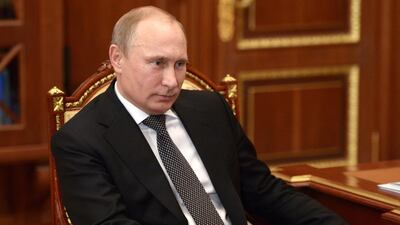MOSCOW // The foundations on which Vladimir Putin built his 15 years’ Russian rule are giving way.
The meltdown of the rouble, which has plunged 18 per cent against the dollar in the last two days alone, is endangering the mantra of stability around which the Russian president has based his rule.
Mr Putin’s approval rating is near an all-time high on the back of his stance over Ukraine, but the currency crisis risks eroding it and undermining his authority.
The president took over from an ailing Boris Yeltsin in 1999 with pledges to banish the economic chaos that characterised Russia’s post-communist transition. While Mr Putin has overseen economic growth and wage increases in all but one of his years as leader, this year’s collapse in oil prices, coupled with US and European sanctions, present him with the biggest challenge of his presidency.
“People thought: ‘He’s a strong leader who brought order and helped improve our living standards,” said Dmitry Oreshkin, an independent political analyst in Moscow. “And now it’s the same Putin, he’s still got all the power, but everything is collapsing.”
In a surprise move on Tuesday, the Russian central bank raised interest rates to their highest in 16 years. That failed to halt the collapse of the rouble, which has plummeted from 34 roubles a dollar to around 70.
This comes after oil prices dived by almost half, to below US$60 (Dh220.4) a barrel. Russia relies on the energy industry for as much as a quarter of its economic output.
The rouble meltdown and accompanying economic slump mark the collapse of Mr Putin’s oil-fuelled economic system of the past 15 years, said an executive at Gazprombank, the lender affiliated to Russia’s state gas exporter.
Neil Shearing, chief emerging-markets economist at London-based Capital Economics Ltd, said the higher interest rate will crush lending to households and businesses and deepen Russia’s looming recession,
“How many bankruptcies await us in January?” opposition lawmaker Dmitry Gudkov said on Twitter. “People will be out of work, out of money. The nightmare is only just beginning.”
Vladimir Gutenev, a lawmaker from the ruling United Russia party said the scale of the interest rate increase was “unacceptable.”
“The situation concerning the financing of industry from bank credits is getting ever closer to critical,” said Mr Gutenev, who’s also first deputy president of the Machinery Construction Union.
Mr Putin’s approval rating is currently at 85 per cent after Russians praised his approach to the continuing conflict in Ukraine. His annexation of Ukraine’s Crimea region, which was part of Russia until 1954, has been particularly popular, along with his dismissal of US and European sanctions that target Russia’s finance and oil industries.
While the unfolding economic crisis may lead to a gradual erosion of support for Mr Putin, however, any protests that occur will mainly be against lower-level officials, said Igor Bunin, head of Moscow’s Center for Political Technologies. He added that some members of the government may be fired as a result of the rouble chaos.
“Putin is the symbol of Russia and the state for ordinary Russians,” he said. “People see him as a lucky star who’ll save them. So they’re afraid to lose him as a symbol.”
* Bloomberg

